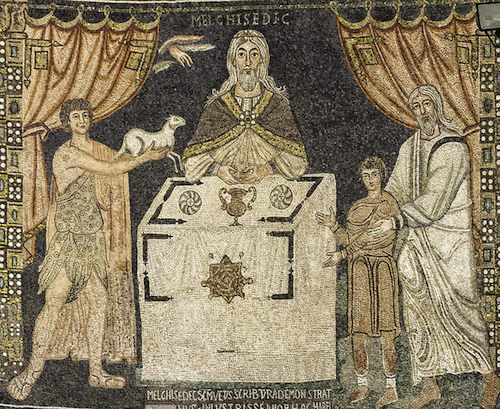We run our website the way we wished the whole internet worked: we provide high quality original content with no ads. We are funded solely by your direct support. Please consider supporting this project.

The Centrality of Christ in Hebrews, Part 2
The intensely Christocentric reading of the Old Testament that I introduced in the previous post is reflected throughout the book of Hebrews. Here I want to cite two more examples of how this writer saw Christ at the center of the OT.
Hebrews 7
Here the author argues for the superiority of Christ’s priesthood over the Levitical priesthood by noting that Abraham gave a tenth of his spoils to Melchizedek, king of Salem, and Melchizedek, in return, blessed him (Heb. 7:4, cf. Gen. 14:20). Since the biblical record never mentions the parents of Melchizedek, this author concludes he is a type of Christ, “[w]ithout father or mother, without genealogy, without beginning of days or end of life, resembling the Son of God, he remains a priest forever” (Heb 7:3). Four times this author applies to Christ a Psalm that celebrates David’s unending priestly role as king by saying his priesthood was “in the order of Melchizedek” (Ps. 110:4; cf Heb. 5:6, 10; 7: 17, 21).
Now, since the Levites are descendants of Abraham, this author concludes they were “in the loins” of Abraham when he paid tribute to Melchizedek and when Melchizedek blessed Abraham. Hence, this author concludes that the Levites themselves paid tribute to, and were blessed by, Melchizedek (7:9-10). And since the one who pays tribute to another thereby acknowledges the superiority of the one they pay tribute to, and since “without doubt the lesser is blessed by the greater” (7:7), it follows, in the mind of this author, that Christ is superior to the Levites.
While we are clearly dealing with some ancient interpretive strategies that are quite foreign to our modern way of thinking, it’s also the case that the way this author applies these strategies reflects the intensity of his Christocentric reading of the OT. As he surveys Scripture through the lens of Christ, this author discovers truths that no one would ever discern were they not reading through this lens.
Hebrews 10
Now let’s consider the creative use the author of Hebrews makes of Psalms 40:6-8. The author is in this case showing the superiority of Christ’s sacrifices over the sacrifices of the OT. He begins by quoting the Greek (Septuagint) version of verse 6. This is significant, because whereas the Hebrew text has the Psalmist saying, “my ears you have opened” [literally, “dug out”] (40:6), the Septuagint has “a body thou hast prepared me.” It’s not clear why the Greek translators made this alteration, though, on the assumption that they were not dealing with a now-lost textual variation, the best guess is that they understood “ears” to be an idiomatic expression for a person’s whole being.
In any event, the original passage expresses the Psalmists conviction that the Lord wants his whole being rather than his sacrifices. For the author of Hebrews, however, this passage has become nothing less than a declaration of the pre-existent Christ expressing his conviction that God had prepared a body for him because “with burnt offerings and sin offerings [God was] not pleased” (Heb. 10:5-6). The author then seems to bring together elements of both the Septuagint and Hebrew text as he has the pre-existent Christ say, “Then I said, ‘Here I am—it is written about me in the scroll—I have come to do your will, my God” (Heb. 10:7, cf. Ps 40:7-8). On this basis the author is able to proceed to demonstrate that Christ’s sacrificed body is the once-and-for-all sacrifice that God desires and that the new covenant has set aside the old one (Heb. 10:8-22).
This example once again illustrates the intensity with which early disciples combed through Scripture in light of the new revelation of God they’d received in Christ. As is true to some extent of all NT authors, the driving question behind this author’s approach to the Old Testament was, in the words of Richard Longnecker: “What do Scriptures mean when viewed from a Christocentric perspective?” (Biblical Exegesis in the Apostolic Period, 185). What passages might mean outside of this perspective—e.g. the exact meaning that the original author intended—was of little to no concern to them. For all who had eyes to see, the true meaning of Scripture is found in Christ.
While the specific interpretive strategies they use to unlock the way the OT bears witness to Christ are clearly culturally conditioned, the sheer fact that they read the OT in this intensely Christocentric way is clearly not. Indeed, given their understanding of Jesus as the embodied revelation of God who fulfills and supersedes all previous revelations, I submit that there really was no other way for them to read their Bible. Believing as they did all Scripture is “God-breathed” while also believing that Jesus alone reveals what God is really like, they had no choice but to search for ways of interpreting it so that it didn’t compete with Christ, but rather bore witness to him.
Photo credit: Lawrence OP via VisualHunt / CC BY-NC-ND
Category: General
Tags: Bible Interpretation, Christocentrism, Cruciform Theology, New Testament, Old Testament
Topics: Christology
Related Reading

Did God Kill King Saul?
When we approach Scripture with the assumption that it is all God-breathed for the purpose of bearing witness to Christ, even the most trivial contradictions in Scripture can acquire theological significance. This is what I argue in Cross Vision. Here I want to illustrate this by briefly discussing the theological significance of a curious discrepancy…

To What Extent is the Old Testament a Sufficient Revelation of God? (podcast)
Greg considers the relationship between the testaments. Episode 548 http://traffic.libsyn.com/askgregboyd/Episode_0548.mp3

Violence: What Did Jesus Do?
Thomas Quine via Compfight Here’s a spot-on reflection on what Jesus taught us about responding to violence. Whatever you think about the justification of violence in particular situations, as Christians we simply cannot escape the fact that Jesus demonstrated another way. From the reflection: And though he had access to unlimited power to have himself released…

Podcast: Overflow Episode 1 — Dust, Flashlights, and Heathens
Dan and Brianna tackle some tough questions: —Is it okay for Christians to be cremated? —How can we preach from the OT with authority? —What should a Christian academic know in a secular school? http://traffic.libsyn.com/askgregboyd/Episode_0320_overflow_1.mp3

What does the Bible mean when it says God “sent an evil spirit” on certain people?
Question: In Judges 9:23, I Samuel 16:15ff and 18:10 it is said that God sends evil spirits on people. Doesn’t this support the idea that everything Satan and demons do is under God’s sovereign control? Answer: I’ll make six points in response to this question. 1) If everything Satan and demons do is under “God’s…

What’s the Purpose of the Old Testament Law?
Whereas the old covenant was rooted in the law, the new covenant is rooted in simple faith, such as Abraham had. Whereas the old covenant was forged with one particular nation, the new covenant is available to all who are willing to accept it, regardless of their ethnicity and nationality. Whereas forgiveness of sins within…
